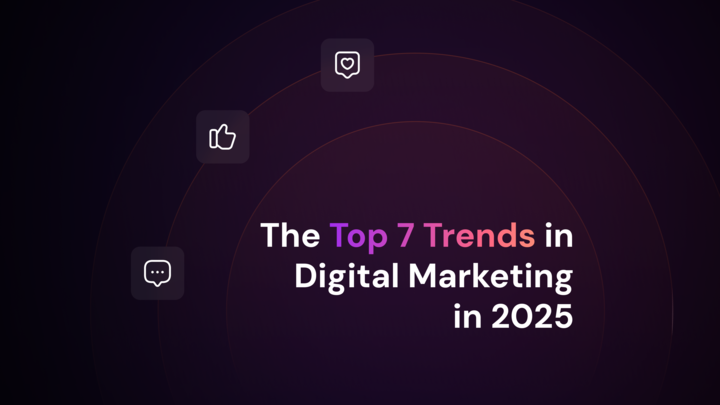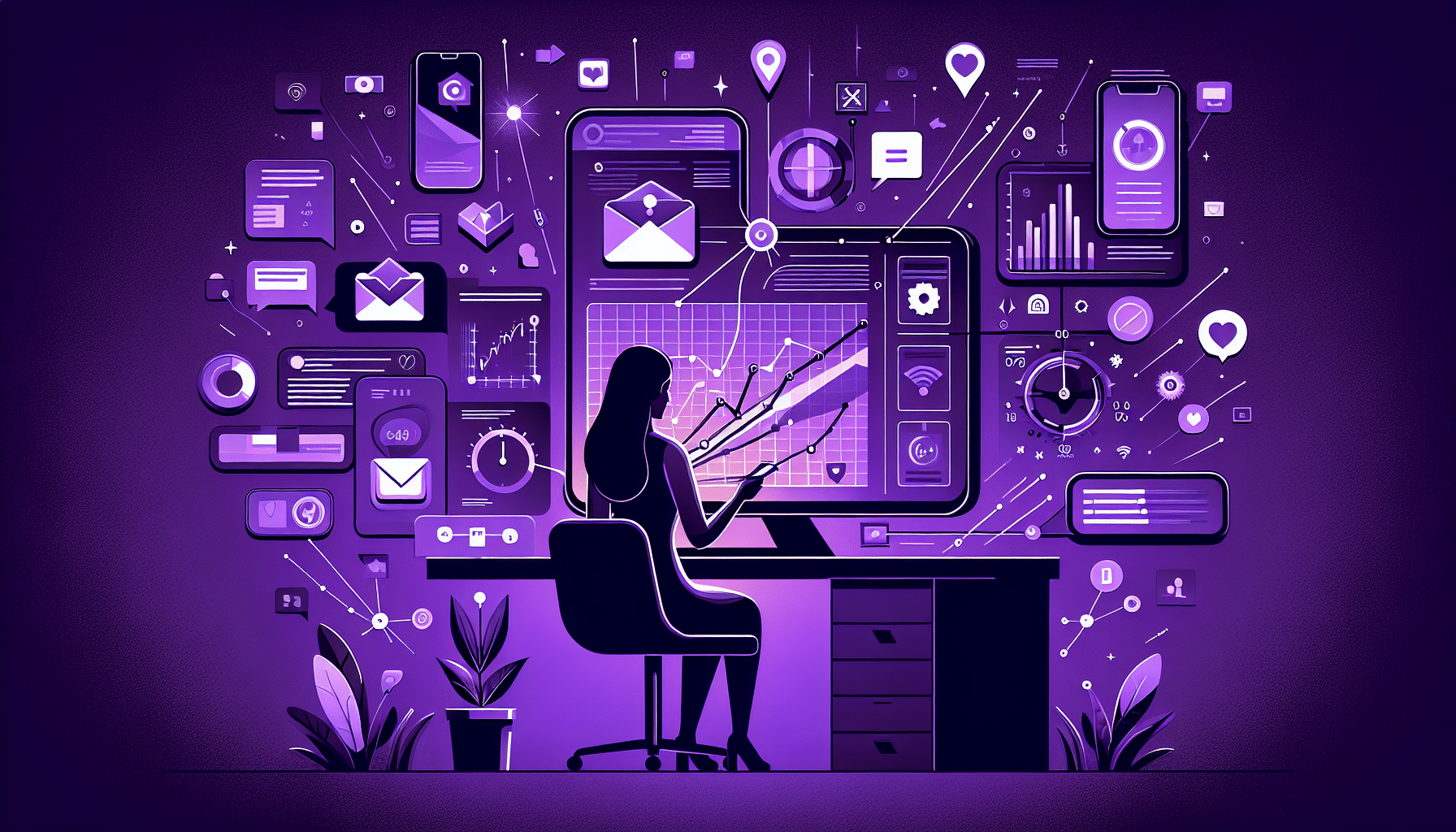Keeping up with digital marketing trends for 2025 might seem overwhelming, especially with the array of channels, strategies, and tools available.
From AI advancements that help tailor content to shifts in consumer behavior, each challenge offers marketers and creative professionals an opportunity to step up their game. It is just about keeping up with the market and getting ahead of the curve regarding strategies and overall results.
Let’s explore seven digital marketing trends for 2025, which will shape the future of digital engagement and help brands build stronger connections with their audiences.
The Top 7 Trends in Digital Marketing in 2025
1. AI-Powered Content Personalization
Artificial intelligence won’t stop evolving anytime soon, offering marketers exciting tools and features that can be added to a digital marketing strategy.
In 2025, AI will continue revolutionizing how content is delivered to audiences. Customers seek unique experiences, and media organizations, brands, and even creators must know how to offer exciting and engaging content to each person.
Tools such as Arena’s AI Search and AI Summary improve the reader experience by delivering hyper-personalized content recommendations, answering queries, generating page summaries, and ensuring users stay informed with the latest updates.
With the help of AI, marketers no longer need to speak to a single type of customer. This enables brands to reach audiences with tailored messages in real-time.
2. The Rise of Niche Communities
People want to feel like they are part of something bigger than themselves, and participating in online communities around shared interests might just do the trick.
Building a safe and inviting community tailored to your audience encourages meaningful conversations and enhances customer and fan experiences. By targeting niche audiences, brands can ensure their products attract attention from those most likely to engage with them.
Influencer marketing is also shifting toward micro-influencers, who create stronger connections within niche communities. Audiences are gravitating toward authenticity, making genuine partnerships and original content more impactful than broad, generic campaigns.
Tools such as Arena Community can help brands, creators, and media groups bring readers and customers from social media to their websites, creating opportunities to enhance fan loyalty, customer engagement, and monetization.
3. Immersive Brand Experiences
As AR and VR technology become more accessible, brands can use them to create immersive, tailored experiences for their audiences.
For example, an eyewear e-commerce platform could offer an AR filter that lets users virtually try on different sunglasses, helping them make more confident purchase decisions. This interactive approach keeps customers engaged, reduces return rates, and enhances overall satisfaction.
In sports coverage, AR and VR can bring fans closer to the action like never before. Broadcasters can use VR to offer 360-degree views of live games, allowing viewers to experience the thrill from different angles as if they were in the stadium.
4. AI Agents for E-Commerce
As we’ve said before, AI is here to stay, and its impact extends far beyond content generation. In e-commerce, for example, artificial intelligence’s hyper-personalization helps customers make smarter, faster, and more informed decisions.
Using conversational marketing, AI-powered agents and AI chats can answer questions, guide customers in choosing the right product, help users open tickets, and resolve all sorts of issues in real-time. This helps relieve the load off support staff while ensuring that customers receive the help they need.
Beyond retail, AI-powered assistants are transforming industries in new and innovative ways. In sports coverage, AI can analyze games in real-time to generate automated commentary, player insights, and predictive analytics, enriching the fan experience.
5. User Intent Reshapes SEO
Although SEO will remain essential, one of the major marketing trends for 2025 is the shift in how it’s done.
For years, marketers followed the “Google way” of SEO, which is heavy on keywords, backlinks, and other tactics. However, the rise of AI has led to major changes in how search engines work, resulting in a surge of generic, keyword-stuffed content. Google knew this was a problem and worked to refine its algorithms to prioritize a more meaningful approach.
A key factor now is user intent—the purpose behind a search query. Instead of just matching keywords, Google prioritizes content that directly answers users’ needs, whether they’re seeking information, making a purchase, or solving a problem.
This means marketers must focus on creating high-quality, relevant content that directly addresses user needs rather than just optimizing for keywords.
6. Human + AI Content for Best Results
We’ve already discussed how AI can help users find personalized content that meets their needs and interests. However, 50% of consumers can spot AI-generated content and tend to distrust content written solely by AI.
A study by NP Digital discovered that human-generated content received 5.44x more traffic than AI-generated content every month. Although AI can write content faster, it is the human touch that ultimately delivers Google’s E-E-A-T guidelines – an acronym for Expertise, Experience, Authoritativeness, and Trustworthiness.
One of the biggest marketing trends for 2025 is employing a hybrid approach, which allows for effective collaboration between AI capabilities and human professionals. Marketers can balance efficiency and quality in their content strategies by assigning tasks to AI and reserving strategic content development for human expertise.
7. Optimizing Strategies with Data Insights
Embracing a data-driven approach is more crucial than ever. Companies that still haven’t integrated analytics to track behaviors and user engagement, map customer journeys, and predict trends face the risk of falling behind.
In 2025, the focus will shift toward customized reports, seamless integrations, and dynamic dashboards as essential components of a well-crafted marketing strategy. Consolidating data from various sources, such as social media, email marketing, Google Ads, and CRM into a single dashboard gives you a competitive advantage.
This approach allows for real-time campaign adjustments and deeper insights into customer behavior, speeding up and making strategic decision-making more effective.
Embracing the Digital Marketing Trends for 2025
The year is shaping up to be a transformative year for digital marketing. Between AI advancements, the expansion of immersive experiences, and the rise of online communities, these trends help guide marketers toward more personalized, engaging, and effective strategies.
As marketing tools, data, and strategies evolve, staying ahead of the competition is essential for creating deeper connections with audiences, driving brand loyalty, and enhancing overall customer experiences.
If you want to stay ahead of the marketing game, sign up now at Arena and start using our powerful features to boost engagement and retention. Join thousands of brands that trust Arena to enhance key business opportunities.



